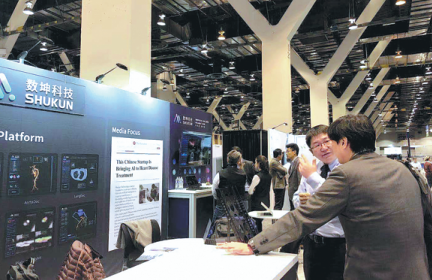Artificial intelligence was arguably the most popular term for those attending the 2019 Radiological Society of North America's annual meeting-a heavyweight trade fair-in Chicago, the United States, in early December.
For Chinese AI startup firm Shukun Technology, the participation confirmed that its footprint in AI-backed medical imaging and diagnosis is on the right track and has huge market potential.
Together with bigger international medical names, Shukun is showcasing two of its products: CTAs for coronary arteries and the head and neck.
"We use software, database and machine learning algorithms to make diagnosis more accurate," said Anne Ma, Shukun's co-founder and CEO. "We hope the products will help doctors make better diagnoses and plan surgery faster than they can now."
According to the 2017 Report on Cardiovascular Diseases in China by the National Center for Cardiovascular Diseases, the country had more than 290 million cardiovascular disease patients, and 3 million die each year.
Founded two years ago in Beijing, Shukun's specialty is in the diagnosis of cardiovascular-related disease. It uses data, along with software and algorithms, to model human hearts and diagnose heart disease.
Shukun has accelerated the commercialization of its technologies to assist cardiovascular diseases diagnosis in more than 42 cities in China, and claimed to have the largest market share in the number of products installed in Chinese hospitals-particularly in 200 top-tier hospitals-among medical AI companies in the cardiovascular disease sector.
But Ma admitted that cardiovascular disease diagnosis requires a much more sophisticated technological process, together with a complex data collection process, due to the lack of data access from open sources. This will inevitably retard the machine learning process.
The key to Shukun's work, and what Ma said sets it apart from others in the field, is its world leading original medical AI neural network with more than 1 billion neurons.
A recent study conducted by University Hospitals Birmingham NHS Foundation Trust in the United Kingdom found that AI is on a par with human experts when it comes to making medical diagnoses based on images. The biggest benefit comes from the potential easing of strain on resources, freeing up time for doctor-patient interactions and even aiding in the development of tailored treatment.
Also joining RSNA's dedicated AI Showcase exhibition session was Japan's Fujifilm. The company displayed its latest solution bringing diagnostic radiology, mammography and cardiology together on the server-side, enabling immediate interaction with these modality imaging data sets through a single AI-enabled platform.
"We are showing our commitment to progressing AI technology to empower physicians to make more efficient and impactful care decisions," said Bill Lacy, vice-president, medical informatics, Fujifilm.
Belgium pharmaceutical company UCB, which has mature therapies in epilepsy and osteoporosis, is considering designing such products for screening osteoporosis and forecasting possible epileptic seizures for use in hospitals or as smart phone apps for patients.
"The diagnosis rate of some diseases is low or it may take years before a correct diagnosis. We feel the responsibility to help patients and doctors achieve a better and earlier diagnosis," said Taco van Tiel, vice-president and head of international markets at UCB.
Zhou Wenting contributed to this story.

